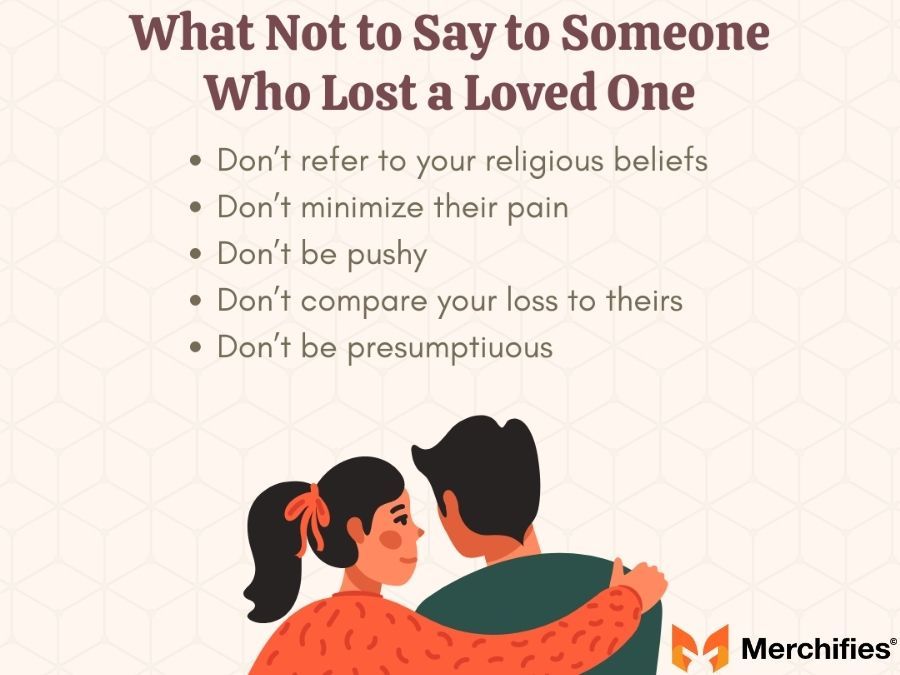-da0801079a650a2e.jpeg)
What to Say When Someone Dies: Heartfelt Comforting Words for the Grieving
Find comforting, sincere words to say when someone dies — gentle guidance to support grieving loved ones with empathy, compassion, and meaningful expressions of care.

Blog Post Contents
The profound sadness of losing a loved one often leaves us grappling with overwhelming emotions, not least of which is the struggle to find the right words to comfort those left behind. When death touches someone we care about, our desire to offer genuine support is immense, yet the fear of saying the wrong thing can make us hesitant or resort to empty platitudes. You want to offer meaningful comfort, something more than just a passing "sorry for your loss."
This article is designed to be your compassionate guide, offering empathetic insights, specific phrases, and actionable advice to genuinely support someone experiencing the death of a loved one. As Hannah Gale, a seasoned relationship expert and empathetic communicator, shares from her extensive experience, the most powerful offering is often not perfection, but rather our sincere presence and heartfelt intention to connect. It's about letting them know they are not alone in their grief journey.
Understanding Grief: The Foundation of Compassionate Comfort
Before we delve into specific comforting words, it's crucial to grasp the nature of grief itself. Grief is a deeply personal and complex process, making it difficult for anyone to navigate.
Grief is Unique & Non-Linear
Unlike a common cold, grief doesn't follow a predictable timeline or a set of neat stages. It's a swirling mix of emotions that can hit unexpectedly, ebb, and flow. Each person grieves differently, influenced by their relationship with the deceased, their personality, past experiences, and their support system. There's no "right" or "wrong" way to grieve, and understanding this is the first step toward offering true comfort.
The Griever's Need
At their core, someone grieving the death of a loved one needs validation for their immense pain, a safe space for their raw emotions, and the steady, unwavering presence of caring individuals. They don't need someone to "fix" their grief, nor do they need solutions or explanations. They need to feel seen, heard, and understood in their profound sorrow.
Your Role
Your role as a comforter is to listen, to witness their pain without judgment, and to offer steady, gentle support. It's about creating an environment where they feel safe to express their grief, knowing you're there to hold space for them, not to diminish or deflect their feelings.

What to Say: Phrases That Offer Genuine Comfort
Finding the right comforting words for death of a loved one can feel like navigating a minefield, but focusing on sincerity and empathy can light the way. Here are phrases that genuinely help.
Acknowledging the Pain Directly
Sometimes, the simplest and most direct acknowledgment of their profound loss is the most powerful. It shows you recognize the gravity of their situation.
- "I'm so incredibly sorry for your loss. My heart breaks for you and your family."
- "There are no words to express how deeply saddened I am by [Name]'s passing. I can't imagine what you're going through."
- "This is truly devastating news, and I'm so sorry you're experiencing such pain."
Validating Their Feelings
Grieving individuals often feel isolated or pressured to "be strong." Validating their feelings gives them permission to feel their emotions without shame.
- "It's okay to feel whatever you're feeling right now – anger, sadness, confusion. All of it is valid."

- "There's no right or wrong way to grieve. Please don't feel like you have to put on a brave face for me."
- "I can only imagine how incredibly difficult this must be. Please know I'm here to listen, without judgment."
Sharing Positive Memories
When appropriate, sharing a brief, positive memory of the deceased can be a beautiful way to honor their life and remind the grieving person of the love that surrounded them.
- "I will always remember [Name] for their incredible [specific quality, e.g., infectious laugh, kindness, wisdom]. They truly touched so many lives."
- "I cherished [a specific memory with the deceased, e.g., 'that time we all went camping and they told the funniest stories']. They brought so much joy into the world."
- Tip: Keep these memories short, personal, and genuinely focused on the deceased's positive impact. Avoid making it about your relationship with the deceased unless it directly brings comfort to the grieving person.
Offering Specific, Actionable Help
The generic "Let me know if you need anything" often places the burden of asking for help on an already overwhelmed individual. Offering specific, actionable assistance is far more impactful. This is a core tenet of effective bereavement support.
- "I'm dropping off a meal for you and your family on [Day, e.g., Tuesday evening]. No need to do anything, just leave the door open or I can leave it on the porch."
- "Can I help with errands this week? I'd be happy to pick up groceries, take your kids to school, or walk the dog next week."
- "I'd like to take care of [specific task, e.g., the yard work, organizing incoming mail]. Would that be helpful to you?"
- Why this works: It removes the mental and emotional effort required for the grieving person to identify a need and then ask for help. It's a tangible expression of "I'm here for you."
Expressing Your Presence and Love
Sometimes, just knowing someone is there, without expectations, is the greatest comfort. These empathetic words of comfort convey your unwavering support.
- "I'm here for you, in whatever way you need. Whether that's talking, sitting in silence, or just running an errand."
- "I love you, and I'm thinking of you constantly during this incredibly difficult time."
- "Please don't hesitate to reach out, day or night. I might not have all the answers, but I promise to listen."
When You Don't Know What to Say
It's perfectly normal to feel speechless in the face of immense loss. Acknowledging this can be more honest and comforting than fumbling for the "perfect" words.
- "I don't have the right words, but I want you to know I'm thinking of you and heartbroken for your loss."
- "I'm just so incredibly sorry." (Often, simplicity and sincerity are best.)

What NOT to Say: Phrases to Avoid and Why
Just as important as knowing what to say are the phrases to consciously avoid. These common missteps, often well-intentioned, can inadvertently cause more pain or alienate the grieving individual, hindering true bereavement support.
Minimizing the Loss or Pain
These phrases often come from a place of wanting to make the person feel better, but they dismiss the validity of their current suffering.
- "They're in a better place." / "Everything happens for a reason." (Can feel dismissive of their earthly pain and struggles with faith or acceptance.)
- "At least they lived a long life." / "You're strong, you'll get through this." (Invalidates their current pain and implies they should just move on.)
- "Time heals all wounds." (Can feel pressuring and untrue; grief often changes, rather than disappears.)

Making it About Yourself
While sharing your own grief can sometimes be appropriate in very close relationships, avoid hijacking their moment of sorrow to focus on your own experiences.
- "When my [relative] died, I felt..." (Shift the focus back to their grief. If you share, do it briefly to connect, then pivot back to them.)
Empty Promises or Generic Offers
As Hannah Gale often emphasizes in her guidance on communication, general offers of help often fall flat because they require the grieving person to do the emotional labor of identifying their needs and then reaching out.
- "Let me know if you need anything." (Often puts the burden on the grieving person to ask for help when they are least capable.)
- "Call me if you want to talk." (Many won't, due to exhaustion, pride, or not knowing what to say.)
Offering Unsolicited Advice or Cliches
Grief is not a problem to be solved with advice or quick fixes.
- "You need to be strong for your kids." (Adds immense pressure and implies their current feelings are a weakness.)
- "You should try [activity] to distract yourself." (Undermines their need to process their emotions.)
- "You'll find someone else." (Especially for partner loss; dismisses the unique bond they shared and the permanence of their loss.)
Toxic Positivity
Forcing a positive outlook can shut down authentic emotion and make the grieving person feel misunderstood.
- "Look on the bright side, at least they aren't suffering anymore." / "You still have so much to be grateful for." (Can imply their current sadness is wrong or unnecessary.)

Tailoring Your Comfort: Different Relationships & Situations
The most impactful comforting words for death of a loved one are those tailored to the specific context, relationship, andzindividual. Grief etiquette suggests different approaches for varying circumstances.
For Close Family & Friends
With those closest to you, focus on sustained presence, deep empathy, and shared history. You can be more open with your own sorrow and offer a truly intimate space for their grief. This is where active listening truly shines.
For Acquaintances or Colleagues
Keep your messages respectful, professional, and sincere. A brief, heartfelt note or quiet word of sympathy acknowledging their loss is usually appropriate. "My deepest condolences on your loss. I am thinking of you during this difficult time."
For the Loss of a Child
This is an unimaginable grief. Acknowledge the unique, profound, and often lifelong nature of this loss. Avoid any mention of future children or trying to find a silver lining. Simply express profound sorrow and validate their unbearable pain.

For Sudden or Tragic Loss
Acknowledge the shock, unfairness, and abruptness of the event. Phrases like "I am so stunned and heartbroken for you" can be very validating. There’s often an added layer of trauma that needs to be recognized.
For Long-Term Illness
Recognize the exhaustion and anticipatory grief that often precedes the death. You might say, "I know you've been on a long, hard journey, and I'm so sorry it's come to this point."
For the Loss of a Pet
For many, pets are cherished family members. Validate the profound bond and significant grief. "I'm so incredibly sorry for the loss of [Pet's Name]. They were truly a part of your family, and I know how much you'll miss them."
Cultural & Religious Considerations
Be mindful of different customs, beliefs, and rituals surrounding death and mourning. If you are unsure, it is always better to ask or observe respectfully rather than assume. What might be comforting in one culture could be inappropriate in another.

Beyond Words: Actions Speak Louder Than Words
While finding the right comforting words for death of a loved one is important, often, what you do makes the most significant difference. Practical support and consistent presence are cornerstones of effective grief support.
The Power of Presence
Sometimes, the most profound comfort comes without a single word. Simply sitting in silence with someone, holding a hand, or offering a warm hug can convey more empathy and support than any elaborate speech. Your calm, steady presence tells them they're not alone.
Active Listening
Allow the grieving person to talk without interruption, judgment, or the need for you to "fix" anything. Just listen. Let them share memories, express anger, cry, or sit in silence. Your job is to create a safe space for them to process their feelings, whatever they may be.
Practical Assistance
This is where you can truly be a rock. Offer to bring meals, help with childcare, do yard work, run grocery shopping, or assist with administrative tasks like sorting mail. Specific offers are key, removing the burden from them. "I'm going to the store, what can I pick up for you?" is far more helpful than "Let me know if you need anything."
Consistent Check-Ins
Grief doesn't end after the funeral. The initial outpouring of support often fades, leaving the grieving person feeling even more isolated. Mark your calendar for follow-ups weeks, months, and even a year later. A simple text or call saying "Thinking of you" can mean the world. This is long-term bereavement support.
Remembering Anniversaries
Acknowledging birthdays of the deceased, death anniversaries, or significant holidays can be profoundly comforting. A short card, text, or call on these difficult days shows you remember and care, allowing them to feel their grief is still acknowledged.

Supporting the Supporter: Self-Care While Comforting
Offering consistent grief support can be emotionally demanding. It's essential to practice self-care to avoid burnout and maintain your own well-being.
Acknowledge Your Own Discomfort
It's okay to feel awkward, sad, or unsure of what to do or say. Acknowledging these feelings rather than suppressing them can help you approach the situation with more authenticity and less anxiety. You're human, and witnessing someone's pain is hard.
Set Boundaries
You cannot fix everything, and you are not responsible for carrying all of their grief. It's important to protect your own energy and recognize your limits. You can be supportive without sacrificing your mental health. Say yes to what you can genuinely offer, and don't feel guilty about saying no when you need to.
Seek Support for Yourself
Don't carry the emotional weight alone. Talk to a trusted friend, family member, or even a therapist if you find yourself struggling with the intensity of supporting someone through profound loss. Just as you are there for them, ensure you have a support system for yourself.
Conclusion
When faced with the death of a loved one, the most comforting words are not necessarily eloquent or perfect. As Hannah Gale consistently reminds us, they stem from a place of genuine love, deep empathy, and unwavering presence. Your effort to connect, to acknowledge their pain, and to offer steady, authentic support truly matters.
You don't need to have all the answers or try to erase their pain. Your greatest gift is simply to be there – to listen, to witness, and to offer your true self. Reach out, be present, and provide the sincere comfort that only human connection can bring.

-d4c38c342cdf20ca.jpeg)


-b555fcc6b204c456.jpeg)




